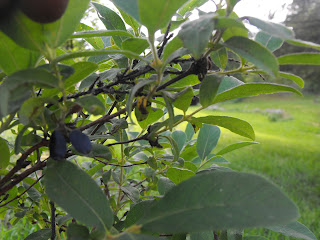"So i saw that there is nothing better for man than to enjoy his work, for this is his lot" ~Solomon~
Sunday, May 27, 2012
Honeyberry
Honeyberry or Haskap
The honey berry is a fruit producing member of the honeysuckle family.This shrub is very hardy to at least -40 f and its flowers which appear early in spring are hardy to 17 f. The Honeyberry is native to Siberia and Japan. Among the earliest flowering of fruiting shrubs, it ripens its blueberry like fruits at least a month ahead of the earliest blueberries and a couple of weeks before most strawberries. Here the Honeyberry fruit is ripening just as the blueberries are flowering. The fruits can be eaten fresh or used in baking or for preserves.
We have several different varieties and this spring we added the two new larger fruited and better flavored varieties from the University of Saskatchewan Haskap breeding program.These varieties are called "Tundra" and "Borealis".These new varieties have fruits that are at least twice as big as the older varieties and much improved out of hand eating flavors. There is much demand for the haskap fruit in Japan for its long held belief of it health benefits. Haskaps are high in vitamin C and a great source of antioxidants.
When planting the Honeyberry at least two different varieties need to be planted for pollination.This plant has proved itself to us as being very hardy and fruitful.They do best when planted in a area with very moist soil.The biggest problem we observed with these plants is that as the berries begin to ripen they disappear quickly. Birds, mostly cedar waxwings, which at all other times are welcome on our property ,are quite fond of these little treats and will eat them all. Covering these plants is a must if you want any fruit as it will disappear fast.
Subscribe to:
Posts (Atom)



